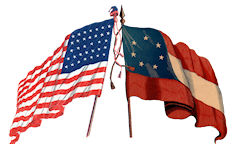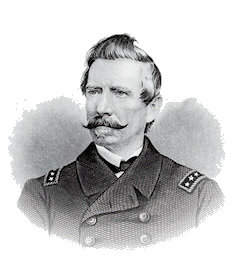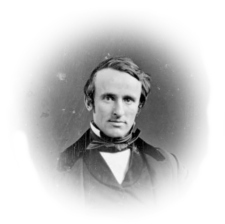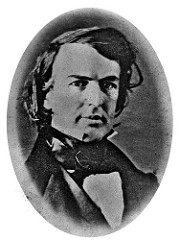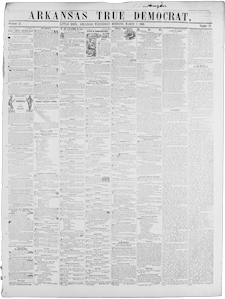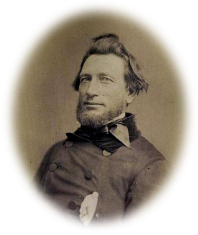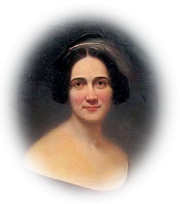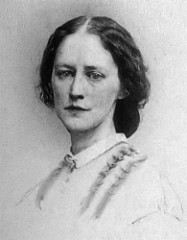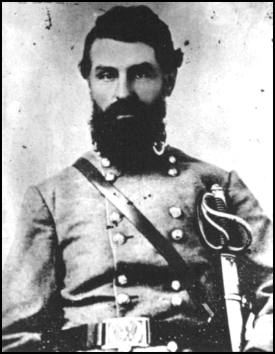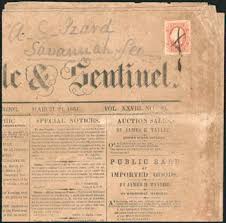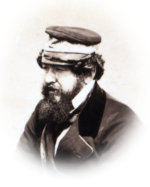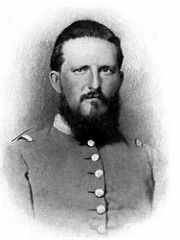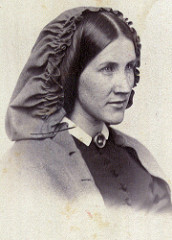August 8.–This evening, at Baltimore, Md., Charles King, from North Carolina, was arrested by officer Stevens, of the Southern District, by order of Major-General Dix, on the charge of being concerned in the raising of a number of men, whoso purpose it was to organize themselves into a crew, and take passage on some boat, intending to capture it in the same manner as the St. Nicholas, and then turn her into a pirate.–Baltimore Patriot, August 9.
–The Nineteenth Regiment of Indiana Volunteers passed through Philadelphia for the seat of war.–N. Y. Herald, August 9.
–F. K. Zollicoffer was appointed a brigadier-general in the rebel army, and assigned to the command of the Department of East Tennessee. On assuming his command, he issued a proclamation assuring all who desire peace, that they can have it by quietly and harmlessly pursuing their lawful avocations.–(Doc. 171.)
–The Massachusetts Fifteenth Regiment, under the command of Colonel Charles Devens, left Camp Scott, Worcester, Mass., for the seat of war. This regiment is armed with the Springfield musket, and numbers 1,040 men. They are all tall, muscular men, possessing the lightness of limb and full development of natural powers which denote the true specimen of a soldier. Their dress consists of the regular army uniform–gray pantaloons, blue coats, and hat, which is as neat and useful a thing as our fighting men could have.–N. Y. Herald, August 10.
–One hundred men of the Nineteenth Regiment N. Y. V., commanded by Capt. Kennedy, crossed the Potomac at Rock Ferry, at 1 A. M., and marched to Lorrettsville, Loudon co., Va., where it was reported that a company of rebel cavalry were engaged in the impressment of citizens. “When they reached the town the rebels had left, and they retraced their steps; but late in the afternoon, while upon their return march, they were overtaken with word that another detachment of about 130 cavalry had entered the town. Tired and worn out, almost shoeless, and hungry, the brave follows with a shout at once voted unanimously to return and attack the rebels. Starting at a double-quick time they reached the town, and under the cover of a corn-field gained sight of the cavalry about thirty rods distant. Resting for a few minutes, they heard the rebel captain give orders to mount, and believing they had been discovered and were about to be charged upon, Captain Kennedy charged upon the town at a double-quick, firing two volleys as they ran. The enemy, after firing a few harmless shots, made their way, concealed by houses, out of the opposite side of the town, but not until they had one lieutenant killed and five men wounded.–N. Y. Times, August 18.
–The office of the Democratic Standard at Concord, N. H., was completely relieved of its contents this afternoon by a mob composed of the soldiers of the returned First Regiment and citizens. The Standard published an article reflecting on the soldiers. They demanded retraction, and the Palmers–the editors and proprietors–shook pistols and axes out of the windows and dared the mob, while the city authorities endeavored to quell the disturbance. The Palmers fired four shots, wounding two soldiers. The office was immediately stripped, and the materials burnt in the street. The Palmers took refuge in the attic, but were finally found and carried to the police station, protected by the police, though with great difficulty.–(Doc. 172.)
–Dissatisfaction at the supposed intention of the Government not to receive men in its army who could not speak the English language, and a misconception of a War Department order upon the subject, led to the withdrawal as thus stated:
Department Of State,
Washington, August 8,1861.
To F. A. Alberger, Esq., Mayor of the city of Buffalo, N. Y.:
Dear Sir : I have to acknowledge the receipt of your letter of 5th inst., and to state in reply, that the order to which it refers was officially explained a day or two since by the Secretary of War, but having still been a subject of great misapprehension it has now been entirely rescinded and vacated. Consequently there is no obstacle whatever to the acceptance of the services of volunteers, on the ground of their nationality or language. The contest for the Union is regarded, as it ought to be, a battle of the freemen of the world for the institutions of self-government.
I am very truly yours,
William H. Seward.
–In a communication of this date, in respect to the disposition to be made of contrabands, the Secretary of War informed General Butler that he was to be governed by the act of Congress, 1861, which “declares that if persons held to service shall be employed in hostility to the United States, the right to their services shall be forfeited.”–(Doc. 173.)
–The Massachusetts Fourteenth Regiment, under the command of Colonel Wm. R. Greene, left Fort Warren, Boston Harbor, for the seat of war. The regiment numbers 1,046 members. Their uniform is light brown pants, deep blue jacket, light blue overcoat, and regulation hat. They are armed with the Springfield musket of the pattern of 1842. They have with them twenty-four baggage wagons, four ambulances, two hospital wagons, and 220 horses.
All the field and staff officers of this regiment but two are natives of Massachusetts. Of the whole corps 350 are married men, and 5 widowers with families. It has one “gentleman,” a host of shoemakers and laborers, and samples of every kind of craftsmen and operatives known among us. There are several teachers on the roll, and one “missionary.” There are a great many blacksmiths–more than any other regiment probably will average. The Amesbury section (Co. E) has thirteen disciples of Vulcan on its roll. The farmers are about equal in number to the blacksmiths. There are three artists, one photographer, one physician, only one printer, two students, and a number of hatters and machinists. One-half of the whole regiment is composed of men connected with the boot and shoe business.–N. Y. World, August 9.
–The ” Confederate” Congress in session at Richmond, Va., adopted the following resolution this day:–
Whereas it has been found that the uncertainty of maritime law in time of war has given rise to differences of opinion between neutrals and belligerents, which may occasion serious misunderstandings, and even conflicts;
and whereas the Plenipotentiaries of Great Britain, France, Austria, Prussia, Sardinia, and Russia, at the Congress of Paris of 1856, established a uniform doctrine on this subject, to which they invited the adherence of the nations of the world, which is as follows:
1. That privateering is and remains abolished.
2. That the neutral flag covers the enemy’s goods, with the exception of contraband of war.
3. That neutral goods, with the exception of contraband of war, are not liable to capture under the enemy’s flag, and
4. That blockades, in order to be binding, must be effective; that is to say, maintained by a force sufficient really to prevent access to the coast of the enemy.
And whereas it is desirable that the Confederate States of America shall assume a definite position on so important a point; now, therefore, be it
Resolved, That the Congress of the Confederate States of America accept the second, third, and fourth clauses of the above-cited declaration, and decline to assent to the first clause thereof.
–There was published a letter dated April 15, from Gen. Frost, Missouri Militia, to Gov. Jackson of Missouri, apropos to the President’s proclamation calling out 75,000 volunteers. He advises the Governor to convene the Legislature, proclaim to the people of the Slate that the President’s proclamation is illegal, and especially to take St. Louis, held by United States troops.–(Doc. 174.)
